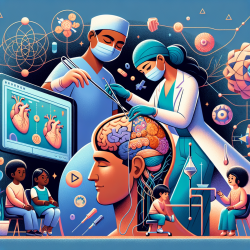Introduction: The Intersection of Neurosurgery and Bioethics
In the intricate world of neurosurgery, where the brain's complexities are unraveled, the integration of bioethics is not just a necessity but a moral imperative. The research article "Bioethics, Neurosurgery, and Integral Healing" sheds light on the profound impact that ethical considerations have on the practice of neurosurgery. As practitioners in the field of speech-language pathology and online therapy services, understanding and implementing these bioethical principles can significantly enhance the quality of care we provide, especially for children.
Understanding Bioethics in Neurosurgery
The article emphasizes the critical role of bioethics in ensuring that neurosurgeons adhere to the highest standards of ethical practice. This is particularly important given the delicate nature of neurosurgical procedures, where the margin for error is minuscule, and the consequences of unethical practices can be catastrophic. By integrating bioethical principles, neurosurgeons can reaffirm their commitment to the sanctity of life and the well-being of their patients.
Lessons for Speech-Language Pathologists
While the article primarily focuses on neurosurgery, the principles of bioethics are universally applicable across all healthcare disciplines, including speech-language pathology. Here are some key takeaways for practitioners:
- Patient-Centered Care: Always prioritize the needs and well-being of the patient, ensuring that their rights and dignity are respected.
- Informed Consent: Ensure that patients and their families are fully informed about the nature of the therapy, its potential risks, and benefits, and obtain their consent before proceeding.
- Transparency and Honesty: Maintain open communication with patients and their families, providing honest information about the progress and outcomes of therapy.
- Continuous Education: Stay informed about the latest research and advancements in your field to provide the best possible care.
Encouraging Further Research and Implementation
The article serves as a call to action for practitioners to delve deeper into the realm of bioethics and explore how these principles can be integrated into their practice. By doing so, we can not only enhance our own skills but also contribute to the broader goal of improving patient outcomes and advancing the field of healthcare.
Conclusion: A Commitment to Ethical Practice
In conclusion, the integration of bioethics into neurosurgery and other healthcare disciplines is essential for ensuring the highest standards of patient care. As practitioners, it is our responsibility to uphold these principles and continuously strive for excellence in our practice. By doing so, we can create a positive impact on the lives of our patients, particularly children, and contribute to the advancement of our field.
To read the original research paper, please follow this link: Bioethics, neurosurgery, and integral healing.










